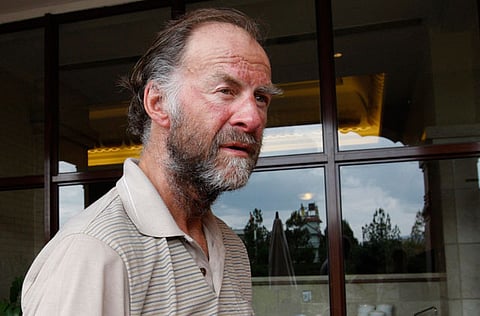Frostbite ends Sir Ranulph Fiennes’ Antarctic bid
Adventurer suffers damage to his left hand and will be evacuated to South Africa

London/Cape Town: Veteran British explorer Sir Ranulph Fiennes has pulled out of an attempt at the world’s first Antarctic winter crossing due to frostbite, the expedition said.
The 68-year-old adventurer, who was co-leading the marathon bid, suffered damage to his left hand and will be evacuated to South Africa.
“While on a training exercise at the weekend Sir Ranulph suffered frostbite to his hand having removed a glove to attempt to fix a broken ski-binding,” spokeswoman Louise Nash said by email.
“This injury is treatable but has necessitated the decision for him to withdraw from the expedition.”
According to the trip website, Fiennes had “very reluctantly decided” to leave his five fellow explorers while an evacuation was still possible before the start of the Antarctic winter.
“This decision has not been taken lightly and it is, naturally, a huge disappointment to Fiennes and his colleagues,” it noted.
A blizzard has put on hold plans to transport Fiennes by snowmobile to Princess Elisabeth Station, about 70 kilometres (43 miles) from the team’s current location.
“Until there is a let-up in the weather conditions, Fiennes will be unable to leave,” said the statement.
The plan is to then fly him to Novo air base, a key route in and out of Antarctica, for a connecting flight to Cape Town, from where the expedition ship sailed in early January.
The remaining five expedition members of the mission, known as The Coldest Journey, will press on and are “in an excellent position” to start the crossing as expected on March 21.
“Sir Ran is leaving but we will carry on,” tweeted team member Ian Prickett.
The group hopes to be the first to make a more than 3,218km (2,000 mile) crossing in winter, during six months of mostly darkness when temperatures often reach minus 70C.
The furthest winter journey in Antarctica so far covered 96km (60 miles) in the early 20th century.
Fiennes has multiple records under his belt. He was the oldest Briton to summit Mount Everest, has crossed both polar ice caps, and has crossed the Antarctic unsupported.
In 2000, he suffered severe frostbite on his left hand while on expedition and sawed off the dead parts of the fingers himself.
“This expedition will present challenges neither I nor any other human being has experienced or been able to prepare for,” Fiennes wrote in a blog post on the expedition website on February 13.
“Perhaps the greatest lesson I have learned about breaking difficult records is that the key ingredient is luck. We are going to need our fair share of it if we are going to complete this crossing.”
Anton Bowring, who is co-leader and in charge of the expedition ship, said the mission still had an excellent chance of success.
“While it is very disappointing for Ran the only aspect of the project that will suffer as a result of these events is Ran’s attempt to be the first person to ski across Antarctica in winter,” he said.



